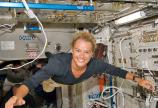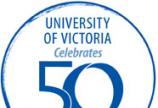“What does space smell like?”
- Melanie Tromp Hoover

It’s a question that most of us are probably curious about but few (well, at least few born before the year 2000) will ever get to answer from first-hand experience. As it turns out, space smells a bit like a hospital—antiseptic, cold and immensely clean—according to Canadian astronaut Julie Payette, who took questions like this one from a huge crowd after her presentation at the University of Victoria on Aug. 27.
A brilliant storyteller and wide-eyed dreamer, Payette initiated the countdown to UVic’s 50th anniversary celebrations with “The Earth from Above: An Astronaut’s Perspective”—a gorgeously illustrated and pointed evening lecture that took the Farquhar Auditorium’s packed house on a journey around the world from 250 miles up.
“When you go to space, you find a perspective that you don’t have when you live on the planet,” she explains, flipping through stunning photographs of the earth’s surface shot from the International Space Station (ISS).
For Payette, this newfound perspective included a world with shrinking ice at both poles, stark evidence of urban density on the rise and entirely absent political borders between nations (save for Pakistan and India—and only because this line is incredibly well-lit at night).
Looking at a photo of a forest-and-lake-filled Canada, she noted “As you can see, we’ve got a lot of room to welcome new people.”
With a few quips and fascinating anecdotes, Payette also described the Olympic-like training regimen all astronauts go through before heading into space (to date, she’s logged 600 hours orbiting Earth over two separate missions in 1999 and 2009). Given this experience, she demystified the ins-and-outs of take-off and then gave the audience an intimate picture of what daily life is really like aboard the ISS.
“You have to learn to get along; it’s like the UN up there,” she said, referring to the six astronauts from around the world on board at all times. “Well, maybe a UN that works.”
Looking ahead, Payette was concerned when talking about the thinning atmosphere around Earth (clearly visible as a thin green line around the globe from the ISS’s viewpoint) but is optimistic when it comes to the capacity and endurance of humanity.
“The planet is not going to collapse tomorrow and we’re not all going to disappear overnight,” she said. “I think we will be able to adapt ourselves and technology will take over.”
This evolution might mean commercial travel in space and hotels on the moon and Mars, she imagines. Nodding to the places space exploration has gone since Neil Armstrong landed on the moon in 1969, Payette truly believes that space travel will become accessible to civilians in the not-too-distant future.
“Exploration and pushing the limit is what makes us better,” said Payette in closing.
Awarded an honorary degree from UVic in 2002, Payette is co-chair of the 50th anniversary’s 17-person honorary cabinet, a group assembled as a reflection of the core values that have and continue to shape UVic’s path.


